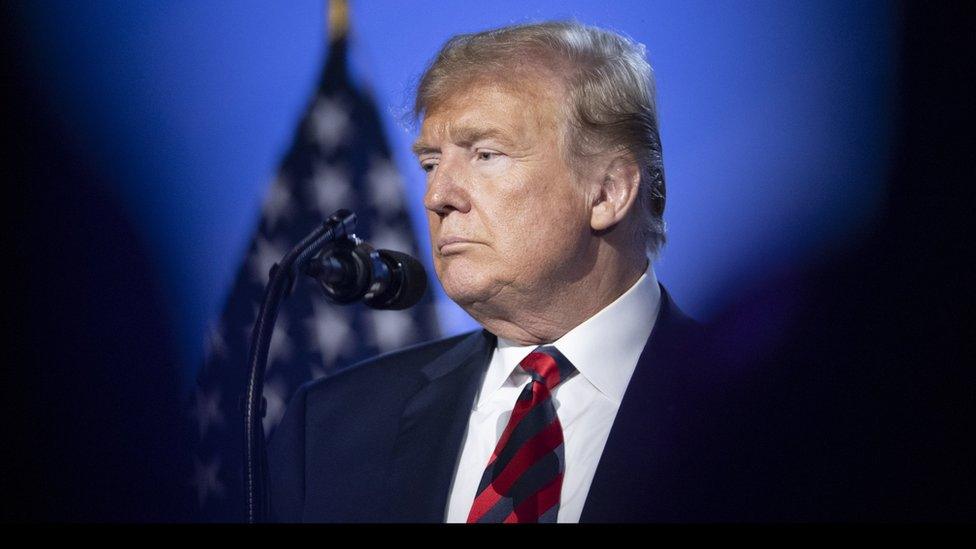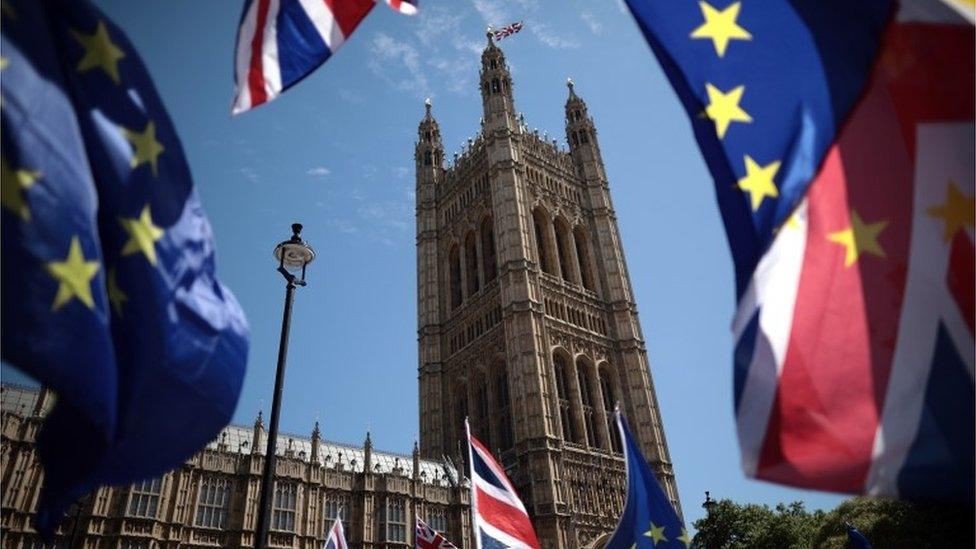Donald Trump: Brexit is turning out 'a little bit differently'
- Published
- comments

Donald Trump has raised questions about whether the UK's current Brexit plan is "what they voted for".
The US president said "Brexit is Brexit" but it was turning out "a little bit differently" with the UK "partially involved" with the EU.
"Maybe they're taking a little bit of a different route," he went on.
His comments at a press conference in Brussels were made before his visit to the UK - as details of Theresa May's Brexit plan were published.
Asked about his remarks, Mrs May said her plan "absolutely delivers on the Brexit people voted for".
Mr Trump backed a Leave vote ahead of the 2016 EU referendum, when he was a US presidential candidate, and he was asked for his views at the Nato summit press conference.
"It's not for me to say," the US president said.
"I'd like to see them be able to work it out so it can go quickly, whatever they work out."
Trump on Brexit
It's not the first Mr Trump has had his say on the UK's relationship with the EU:
In May 2016, before the EU referendum, he said he thought the UK was "better off without" the European Union
"I'm not making that as a recommendation, just my feeling," he said, describing the migration crisis as a "horrible thing for Europe" and blaming the EU for driving it.
In August 2016, after the UK had voted to leave, he tweeted: "They will soon be calling me Mr Brexit!"
In January 2017, shortly after becoming president, he gave an interview to Tory MP Michael Gove, external - a prominent Leave campaigner and former journalist - saying: "I think Brexit is going to end up being a great thing."
Also in that interview, the president said the EU was "a vehicle for Germany" and that the UK was "so smart in getting out".
And asked why thought the UK voted to leave, he said that "people don't want to have other people coming in and destroying their country"
Mr Trump's predecessor, Barack Obama, had encouraged a Remain vote, warning of the consequences for trade if the UK left the EU.
It's a big week for Brexit

Mrs May is under pressure over her proposals for a future trading relationship between the UK and EU. Senior ministers Boris Johnson and David Davis resigned, saying they cannot support the proposals.
Some Tory backbenchers and other Brexit campaigners are also unhappy, saying it means the UK will be too closely tied to the EU.
The government has now published a White Paper, external giving more details of its plans.
They are aimed at avoiding a hard border in Northern Ireland, securing frictionless trade with the EU while also leaving the single market and customs union and regaining control of the UK's borders. The UK would accept a "common rule book" for trade in goods, but not services.
There are also plans for what is described as an "association agreement", with "joint institutional arrangements" between the EU and the UK.
The state of play
The UK is set to leave the EU on 29 March 2019, after the 2016 referendum in which people voted by 51.9% to 48.1% for Brexit.
The two sides are negotiating outstanding issues related to its departure as well as the outline of their future relationship once a proposed transition period comes to an end, on 31 December 2020.
Both are aiming for an agreement by October, to allow enough time for the UK and European parliaments to vote on what is decided.
Dominic Raab, who became Brexit secretary on Monday after Mr Davis quit, told people who are "criticising or carping" about the plan that they needed to come up with credible alternatives of their own.
The White Paper is not the final deal, as the detailed talks are yet to take place with the EU. The EU has welcomed its publication and said it will respond when it has seen the plans in detail.